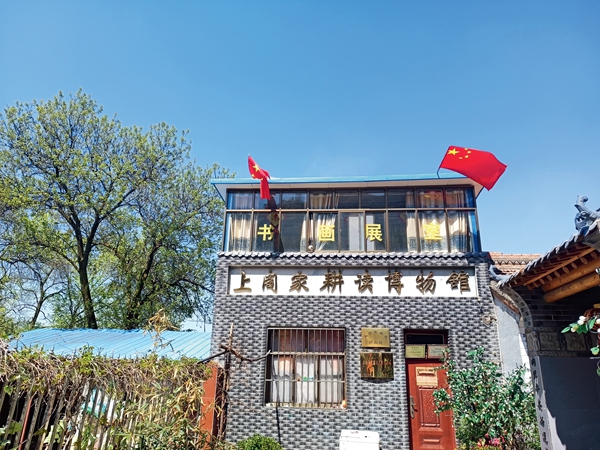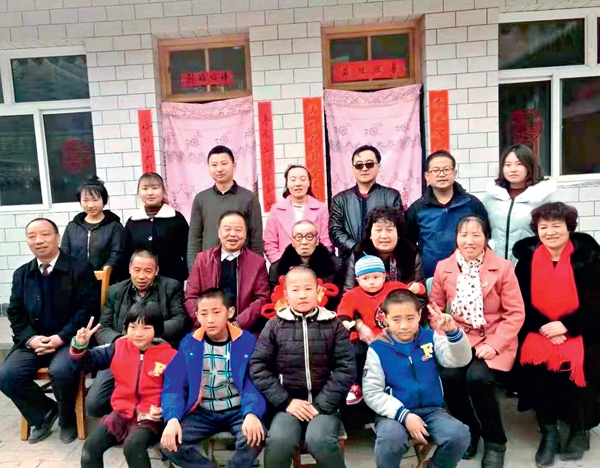Inheriting Family's Virtues Through Reading

Yan Hezhong is a retired bank employee in Zhuanglang County, in Pingliang, a city in Northwest China's Gansu Province. He and his wife, Chen Qiaomei, are members of a 21-member, four-generation family. Chinese poet Su Shi, of the Song Dynasty (960-1279), once wrote that reading helps a family maintain long-time vigor and prosperity and the virtues of loyalty and honesty of a family can be passed from generation to generation, like passing down classic literature. Everyone in Yan's family enjoys reading. The family has built a special museum in their home to keep old items, and to pass down the family's virtues.
Family Museum
Yan was born in the 1950s in Dawan, a village in Yuebao, a town in Zhuanglang County. Yan's family has farmed for generations. What's more, the family members share an interest in reading. "My grandfather used to teach in our hometown. My father is known in our village for his love of reading. My father used to work as an accountant and secretary of the Party branch of our village. When I was young, my father urged me to study hard, live a thrifty life, and know the importance of showing gratitude," Yan says. He likes reading because of his father's influence.
Yan retired as a bank employee, in Zhuanglang, in 2016. Prior to working for the bank, Yan had worked as a civil clerk, an accountant, and Party branch secretary. Much of his work throughout the years has involved the village and/or agriculture. As he was born and raised in a village, Yan knows clearly that his "roots" are in his hometown. Almost every weekend, he works on his family's farm.
In 2010, as Yan was about to rebuild his family home, he found several old items, which had been kept in the house for years. He had an idea — build a "museum," of his family, to maintain such items. "Now, our lives are much better. When we were building the new house, I found some old items were broken, and some had been thrown away as trash. But I hope our offspring can have a look at the remaining old items, from which they can review what life was like in the past," Yan says.

Keeping Memories Alive
Yan discussed the idea of "establishing a museum" with his family, and they supported him. They rebuilt the old house into a two-story, 200-square-meter museum.
A wooden, oblong-shaped case, with two wooden sticks penetrating through it, is among the items on exhibit. Yan tells the younger members of his family the case is called an "air box." By pulling a handle connected to the wooden sticks, one can bring air into a stove, to make the fire burn better.
Yan's family was poor when he was young. His uncle bought an "air box" and gave it to Yan's mother. "When I was a student, the first thing I did after returning home from school was to help my mother cook. But Mom always asked me to go back to my room to stay warm. At first, I thought maybe Mom was afraid I might break the ‘air box,' if I didn't pull the handle properly. However, as I grew up, I gradually understood it was because Mom thought it was too cold to stay in the kitchen, where there was no heating equipment," Yan recalls. "Mom died when I was in my 20s. Nowadays, we have gas or electromagnetic cookers. But I still think of my mother every time I look at the ‘air box' kept in our museum."
In addition to the old items from his immediate family, Yan sometimes collects old items from relatives or friends. He adds those items to the collection in the "museum," to keep memories of the old days alive.

Influencing a Village
During the past several years, Yan has used a considerable part of his pension to add to and maintain items exhibited in his family's museum. He and his family have spent, combined, more than 800,000 yuan (US $123,077) to operate the museum, which houses four exhibition sections. They are: Books, calligraphies and paintings; "red culture"; production; and, life.
The room of books, calligraphies and paintings contains scrolls and couplets inherited from previous generations, and the family members' photo albums, honorable certificates and graduation albums. More than 3,000 books are also kept in the room. The books' categories include literature, culture, history, finance, science and technology, and personal notebooks.
The "red culture" room contains goods used by Chinese soldiers during the revolutionary period, various crafts, newspapers (published during the 1950s), antiques, and household electrical equipment, such as a radio, black-and-white television and record machine.
The "production" room contains agricultural-production tools, and a wall decorated with 40-plus photos showing what production on farm was like prior to 2000.

One villager, Yan Yongxiong, has reportedly said, "We like to visit Yan's home, to look at the old items exhibited in his house, and to read the books collected there." The museum is located about 50 kilometers from the county center of Zhuanglang. Every year, many people travel to Yan's village to read and/or borrow books from his museum.
Given the positive influence Yan and his family have had on his hometown, Yan's family has been selected a National Most Beautiful Family. The family's museum has been named a patriotic education base of Zhuanglang County.
Yan Zhangzhe, Yan Hezhong's son, says, "A museum is like a textbook, which helps young people know more about our farming culture. Meanwhile, the younger generation can better understand the great changes that have taken place in rural areas of our country. For people of older generations, things kept in our museum help remind them of precious memories about the past."
Photos Supplied by Interviewees
(Source: The Department of Family and Children's Affairs of the All-China Women's Federation/Women of China English Monthly August 2022 issue)
Please understand that womenofchina.cn,a non-profit, information-communication website, cannot reach every writer before using articles and images. For copyright issues, please contact us by emailing: website@womenofchina.cn. The articles published and opinions expressed on this website represent the opinions of writers and are not necessarily shared by womenofchina.cn.






.jpg)

 WeChat
WeChat Weibo
Weibo 京公网安备 11010102004314号
京公网安备 11010102004314号